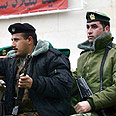
'Muslims persecuting Bethlehem's Christians'
Store owner in West Bank city says 'We are harassed, but you wouldn't know the truth. No one says anything publicly about the Muslims'
With Christmas services here drawing far fewer tourists than in the 1990s and the town's Christian population now at an all-time low, many world leaders and hundreds of major media outlets this week blamed Israel for Bethlehem's decline – often citing false information – while a simple talk with the town's residents reveals a drastically different picture. They say Muslim persecution has been keeping Christians away.
"All this talk about Israel driving Christians out and causing pain is nonsense," a Bethlehem Christian community leader told WND. "You want to know what is at play here, just come throughout the year and see the intimidation from the Muslims. They have burned down our stores, built mosques in front of our churches, stole our real estate and took away our rights. Women have been raped and abducted. So don't tell me about Israel. It's the Muslims."
The Bethlehem leader, like many Christians on the streets here, would not provide his name for publication for fear of retaliation.
Bethlehem's Christian population has declined drastically after the Palestinian Authority took control in December, 1995. Once 90 percent of the city, Christians now compose less than 25 percent, according to Israeli survey information. Christmas celebrations this year attracted about 30,000 tourists – 10,000 more than last year but down from an average of 150,000 in 1994.
Muslim hostility
Many Christians told WND they face constant Muslim hostility.
One religious novelty-store owner cited examples of Muslim gangs defacing Christian property, the PA replacing Christian leaders on public councils with Muslims, and armed Palestinian factions stirring tensions. One such incident was last week's storming of Bethlehem's City Hall, across the street from the Church of the Nativity, believed to be the birthplace of Jesus, by gunmen from the Al Aqsa Martyrs Brigades terror group.
The store owner said "We are harassed but you wouldn't know the truth. No one says anything publicly about the Muslims."
Indeed many leaders in attendance at Christmas Eve Mass in Bethlehem last night took the occasion to blame Israel's recently constructed security fence in the area for Christian woes.
In a televised midnight Christmas speech, PA Chairman Mahmoud Abbas said "Palestinians are seeking a bridge to peace instead of Israeli walls. Unfortunately, Israel is continuing with its destructive policy ... (and) transforming our land into a big jail."
Jerusalem's Latin Patriarch Michel Sabbah, speaking at St. Catherine's Church, adjacent to the Church of the Nativity, called for Israel to remove its "separation barrier, which is causing all kinds of hardships and affecting normal life in Bethlehem."
The Archbishop of Westminster, Cormac Murphy-O'Connor, urged Israel "to build bridges and not walls" and blamed Israel for "(compelling Christians) to leave the land of their birth for foreign lands on account of the political situation."
And a sampling of American media coverage of this weekend's festivities seems to find Israel mostly at fault for the decline in Christian living conditions and population figures.
A widely printed Associated Press article by staff writer Sarah El Deeb opens, "Thousands of tourists and pilgrims gathered in Bethlehem for Christmas Eve celebrations Saturday, bringing a long-missing sense of holiday cheer to Jesus' historic birthplace. ... But Israel's imposing separation barrier at the entrance to town dampened the Christmas spirit and provided a stark reminder of the unresolved conflict."
Today's San Francisco Chronicle states, "For centuries, pilgrims from around the world converged on the Palestinian town of Bethlehem at Christmas, packing Manger Square and the Church of the Nativity, the birthplace of Jesus Christ. ... In 2002, Israel began building a 25-foot concrete wall around the city, severing it from Jerusalem and the northern West Bank. Today, the streets of Bethlehem are quiet."
An earlier article by the Chicago Tribune blamed Israel's fence, constructed in 2002, for collapsing Bethlehem's economy and prompting Christians to leave, even though the mass exodus began seven years prior.
"A towering wall of gray concrete slabs, 30 feet high, cuts across what was once the main road into this town from Jerusalem. Just inside the barrier, past a new Israeli security terminal, a once-bustling neighborhood has become a ghost town. Shops are shuttered or empty, and the streets are deserted. ... The deteriorating economy has led to a steady exodus of the city's Christian residents," the Tribune article reads.
Inaccurate
HonestReporting.com notes the various press accounts are factually inaccurate.
Contrary to the Chronicle report and scores of other media accounts, there is no barrier that encircles Bethlehem. A fence exists only where the Bethlehem area interfaces with Jerusalem, and only a small segment of the fence is a concrete wall, which Israel says is meant to prevent gunmen from shooting at Israeli motorists.
The Bethlehem economy the past few years has actually improved significantly. Tourism has doubled compared to last year, and Bethlehem's main industries are up: Textiles by 50 percent, stone and marble export by 40 percent, and commercial transportation 20 percent. The increases have reportedly brought an influx of millions of dollars into the Bethlehem local economy.
Israel says the Israeli Defense Forces this year is making access to Bethlehem easier for tourists. IDF Lt. Col. Aviv Feigel said, "The military will try to speed the process by not checking every tourist bus, but conducting spot checks of random buses instead." The IDF also instituted a bus shuttle service to Bethlehem to speed travel time to the city.
For years, Bethlehem was largely Christian. But when the PA took control in 1995 it publicly expanded Bethlehem's boundaries reportedly to ensure a Muslim majority, incorporating into the city over 30,000 Muslims from adjacent refugee camps. Then-PLO leader Yasser Arafat unilaterally replaced the Christian-dominated city council with a largely Muslim leadership.
Reprinted by permission of World Net Daily










